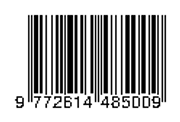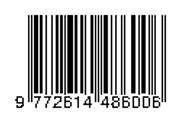Comparison of Insulated Switch Gear with Desiccant Addition to SF6 Gas Quality System at Waru Substation
DOI:
https://doi.org/10.26905/jeemecs.v6i2.6044Keywords:
GSI, SF6, Moisture, DesiccantAbstract
In electrical instrumentality with SF6 gas insulation, the quality of SF6 gas in line with the standard is prime to wise insulation power, if there' a decrease in gas quality, there'll even be a decrease among the number of voltage insulation on electrical equipment. throughout this case, it had been found that the quality of SF6 gas was deteriorating within the Ganz whole GIS Compartment at the Waru Substation Substaction, specifically the position level of the SF6 isolation gas that exceeded the required standard limit. Besides, this GIS isn't equipped with silica gel/desiccant as a condition gripping material and gas sorbent material from amendment PMT (IEEE Std 11251993) that ends throughout a decrease among the standard of SF6 gas. The addition of drier among the GIS is needed to keep up the quality of SF6 gas. These materials are analyzed for quantity and performance once applied within the compartment therefore as that deterioration of the quality of SF6 gas and thus the prevalence of insulation failure is avoided as early as possible, and SF6 remains in its characteristics with a BDV of 78.6 kV/cm (according to SF6 crucial Breakdown Volatge). And it hoped that SF6 gas will add line with it operate as a decent insulating medium. As degree application, a drier experiment has been administered among the GIS compartment at the Waru Substation stationDownloads
References
W. Wang, X. Tu, D. Mei, and M. Rong, “Dielectric breakdown properties of hot SF6/He mixtures predicted from basic data,†Phys Plasmas, vol. 20, no. 11, 2013.
A. T. Nugraha and D. Priyambodo, “Prototype Design of Carbon Monoxide Box Separator as a Form of Ar-Rum Verse 41 and To Support Sustainable Development Goals Number 13 (Climate Action),†Journal of Electronics, Electromedical Engineering, and Medical Informatics, vol. 3, no. 2, pp. 99–105, 2021.
H. Shinkai, H. Goshima, and M. Yashima, “A study on condition assessment method of gasâ€insulated switchgear. part II. influence of moisture in the SF6, detection of a partial discharge on a spacer, repetition discharge and overheating by incomplete contact,†Electrical Engineering in Japan, vol. 176, no. 2, pp. 22–30, 2011.
A. T. Nugraha and L. N. Safitri, “Optimization of Central Air Conditioning Plant by Scheduling the Chiller Ignition for Chiller Electrical Energy Management,†Indonesian Journal of electronics, electromedical engineering, and medical informatics, vol. 3, no. 2, pp. 76–83, 2021.
A. T. Nugraha, D. S. A. Pambudi, A. P. Utomo, and D. Priyambodo, “Battery Charger Design in a Renewable Energy Portable Power Plant Based on Arduino Uno R3,†in Proceedings of the 2nd International Conference on Electronics, Biomedical Engineering, and Health Informatics: ICEBEHI 2021, 3–4 November, Surabaya, Indonesia, Springer, 2022, pp. 147–161.
B. Pancoro, “Variable Speed Drive (VSD) aka. INVERTER.†https://bayupancoro.wordpress.com/2008/07/02/variable-speed-drive-vsd-aka-inverter/ (accessed Aug. 21, 2023).
A. T. Nugraha and R. P. Eviningsih, Penerapan Sistem Elektronika Daya: AC Regulator, DC Chopper, dan Inverter. Deepublish, 2022.
A. T. Nugraha et al., “The Auxiliary Engine Lubricating Oil Pressure Monitoring System Based on Modbus Communication,†in Proceedings of the 2nd International Conference on Electronics, Biomedical Engineering, and Health Informatics: ICEBEHI 2021, 3–4 November, Surabaya, Indonesia, Springer, 2022, pp. 163–175.
M. Syaik, “Analisa system pengaturan kecepatan dengan VVVF inverter dan pengereman pada motor penggerak utama KRL produksi PT.Inka madiun â€.
A. T. Nugraha and D. Priyambodo, “Analysis of Determining Target Accuracy of Rocket Launchers on Xbee-Pro based Wheeled Robots to Realize the Development of Technology on the Military Field,†Journal of Electronics, Electromedical Engineering, and Medical Informatics, vol. 2, no. 3, pp. 114–118, 2020.
R. Fakhrizal, T. Sukmadi, and M. Facta, “APLIKASI PROGRAMMABLE LOGIC CONTROLLER ( PLC ) PADA PENGASUTAN DAN PROTEKSI BINTANG (Y) - SEGITIGA (Δ) MOTOR INDUKSI TIGA FASA,†Jan. 2011.
A. T. Nugraha and D. Priyambodo, “Design of pond water turbidity monitoring system in arduino-based catfish cultivation to support sustainable development goals 2030 No. 9 industry, innovation, and infrastructure,†Journal of Electronics, Electromedical Engineering, and Medical Informatics, vol. 2, no. 3, pp. 119–124, 2020.
“Mengoperasikan Motor 3 Fasa Dengan Sistem Pengendali Elektromagnetik | Royers’s Blog.†https://royers.wordpress.com/2009/12/19/mengoperasikan-motor-3-fasa-dengan-sistem-pengendali-elektromagnetik/ (accessed Aug. 21, 2023).
A. T. Nugraha and D. Priyambodo, “Design of a Monitoring System for Hydroganics based on Arduino Uno R3 to Realize Sustainable Development Goal`s number 2 Zero Hunger,†Journal of Electronics, Electromedical Engineering, and Medical Informatics, vol. 3, no. 1, pp. 50–56, Jan. 2021, doi: 10.35882/JEEEMI.V3I1.8.
A. T. Nugraha et al., “Portable-2WG†Inovasi Turbin Pembangkit Listrik Portable Air Dan Angin Untuk Kebutuhan Rumah Tangga Pada Penduduk Daerah Aliran Sungai. Deepublish, 2022.
A. T. Nugraha and R. P. Eviningsih, Konsep Dasar Elektronika Daya. Deepublish, 2022.
D. S. Kirschen, D. W. Novotny, and T. A. Lipo, “On-line efficiency optimization of a variable frequency induction motor drive,†IEEE Trans Ind Appl, no. 3, pp. 610–616, 1985.
D. Kastha and B. K. Bose, “Fault mode single-phase operation of a variable frequency induction motor drive and improvement of pulsating torque characteristics,†IEEE Transactions on Industrial Electronics, vol. 41, no. 4, pp. 426–433, 1994.
L. Umanand, “Non-Conventional Energy Systems,†Bangalore: Indian Institute of Science Bangalore, 2007.
Downloads
Published
Issue
Section
License
Our ethic statements are based on COPE’s Best Practice Guidelines for Journal Editors.
Publication decisions
The editor is responsible for deciding which of the articles submitted to the journal should be published.
The editor may be guided by the policies of the journal's editorial board and constrained by such legal requirements as shall then be in force regarding libel, copyright infringement and plagiarism. The editor may confer with other editors or reviewers in making this decision.
Fair play
An editor at any time evaluate manuscripts for their intellectual content without regard to race, gender, sexual orientation, religious belief, ethnic origin, citizenship, or political philosophy of the authors.
Confidentiality
The editor and any editorial staff must not disclose any information about a submitted manuscript to anyone other than the corresponding author, reviewers, potential reviewers, other editorial advisers, and the publisher, as appropriate.
Disclosure and conflicts of interest
Unpublished materials disclosed in a submitted manuscript must not be used in an editor's own research without the express written consent of the author.
Duties of Reviewers
Contribution to Editorial Decisions
Peer review assists the editor in making editorial decisions and through the editorial communications with the author may also assist the author in improving the paper.
Promptness
Any selected referee who feels unqualified to review the research reported in a manuscript or knows that its prompt review will be impossible should notify the editor and excuse himself from the review process.
Confidentiality
Any manuscripts received for review must be treated as confidential documents. They must not be shown to or discussed with others except as authorized by the editor.
Standards of Objectivity
Reviews should be conducted objectively. Personal criticism of the author is inappropriate. Referees should express their views clearly with supporting arguments.
Acknowledgement of Sources
Reviewers should identify relevant published work that has not been cited by the authors. Any statement that an observation, derivation, or argument had been previously reported should be accompanied by the relevant citation. A reviewer should also call to the editor's attention any substantial similarity or overlap between the manuscript under consideration and any other published paper of which they have personal knowledge.
Disclosure and Conflict of Interest
Privileged information or ideas obtained through peer review must be kept confidential and not used for personal advantage. Reviewers should not consider manuscripts in which they have conflicts of interest resulting from competitive, collaborative, or other relationships or connections with any of the authors, companies, or institutions connected to the papers.
Duties of Authors
Reporting standards
Authors of reports of original research should present an accurate account of the work performed as well as an objective discussion of its significance. Underlying data should be represented accurately in the paper. A paper should contain sufficient detail and references to permit others to replicate the work. Fraudulent or knowingly inaccurate statements constitute unethical behavior and are unacceptable.
Originality and Plagiarism
The authors should ensure that they have written entirely original works, and if the authors have used the work and/or words of others that this has been appropriately cited or quoted.
Multiple, Redundant or Concurrent Publication
An author should not in general publish manuscripts describing essentially the same research in more than one journal or primary publication. Submitting the same manuscript to more than one journal concurrently constitutes unethical publishing behaviour and is unacceptable.
Acknowledgement of Sources
Proper acknowledgment of the work of others must always be given. Authors should cite publications that have been influential in determining the nature of the reported work.
Authorship of the Paper
Authorship should be limited to those who have made a significant contribution to the conception, design, execution, or interpretation of the reported study. All those who have made significant contributions should be listed as co-authors. Where there are others who have participated in certain substantive aspects of the research project, they should be acknowledged or listed as contributors.
The corresponding author should ensure that all appropriate co-authors and no inappropriate co-authors are included on the paper, and that all co-authors have seen and approved the final version of the paper and have agreed to its submission for publication.
Disclosure and Conflicts of Interest
All authors should disclose in their manuscript any financial or other substantive conflict of interest that might be construed to influence the results or interpretation of their manuscript. All sources of financial support for the project should be disclosed.
Fundamental errors in published works
When an author discovers a significant error or inaccuracy in his/her own published work, it is the author’s obligation to promptly notify the journal editor or publisher and cooperate with the editor to retract or correct the paper.










